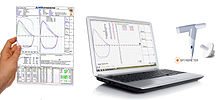

Fitness to dive (more specifically medical fitness to dive) refers to the medical and physical suitability of a diver to function safely in an underwater environment using diving equipment and related procedures. Depending on the circumstances, it may be established with a signed statement by the diver that they do not have any of the listed disqualifying conditions. The diver must be able to fulfill the ordinary physical requirements of diving as per the detailed medical examination by a physician registered as a medical examiner of divers following a procedural checklist. A legal document of fitness to dive issued by the medical examiner is also necessary.
The most important medical is the one before starting diving, as the diver can be screened to prevent exposure in the event of an imminent danger. The other important medicals are after some significant illness, where medical intervention is needed and has to be done by a doctor proficient in diving medicine, and can not be done by prescriptive rules.[1]
Psychological factors can affect fitness to dive, particularly where they affect response to emergencies, or risk-taking behavior. The use of medical and recreational drugs can also influence fitness to dive, both for physiological and behavioral reasons. In some cases, prescription drug use might have a net positive effect when viably treating an underlying condition. However, the side effects of viable medication frequently have undesirable influences on the fitness of a diver. Most cases of recreational drug use result in an impaired fitness to dive, and a significantly increased risk of sub-optimal response to emergencies.
